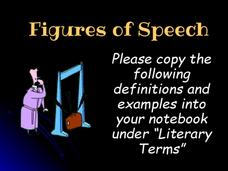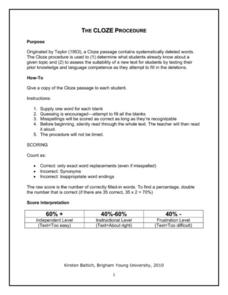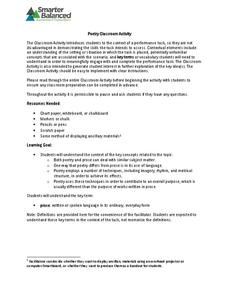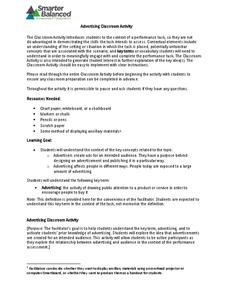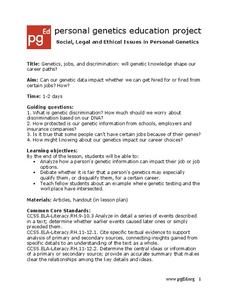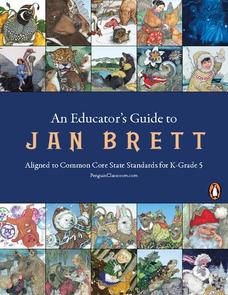Curated OER
Writing a Literary Analysis
What makes writing literary? What comprises analysis? A 15-slide PowerPoint presentation, created by the Purdue University Writing Lab, tackles these questions. The explanations of what makes writing literary and what comprises analysis...
Curated OER
Eliminating Wordiness
Teach your class how to write concisely and edit writing. The slide show covers be verbs, active voice, passive voice, repetitive wording, and more. Complete with numerous examples and images, it is a comprehensive resource that could be...
Curated OER
Figures of Speech
Give your learners quick definitions of simile, metaphor, and analogy. As the first slide in this PowerPoint suggests, you can use the presentation as a warm-up and have scholars record the words and their meanings in a Literary Terms...
Curated OER
Vocabulary Set 3
The Latin roots sent/sens, soph, and tend/tent are featured in this vocabulary-building vocabulary presentation. The definition of the root is provided and then a word built on this root is used in a sentence.
Curated OER
Peer-Editing Worksheet for Expository Essay
The big idea presented in this peer editing worksheet is that writers make use of the Criterion Online Writing Evaluation as part of the writing process. Criterion evaluates the skill level of writers and permits instructors to design...
Curated OER
Today We Will Learn About Prefixes: non- not
Nonverbal, nonfat, nonfiction. The prefix non- (meaning not) is the focus of this affixes presentation that concludes with a check for understanding.
Curated OER
Two Sides, Same Coin: How Political Beliefs Influence Language Use
Learners read several magazine articles on the same topic written from different political perspectives, paying particular attention to the diction, syntax, and arguments presented in support the point of view expressed. They then select...
Curated OER
The Adventures of Huckleberry Finn: Cloze Procedure
Are your readers ready for The Adventures of Huckleberry Finn? Use a cloze procedure to determine if the reading level of Twain’s classic is appropriate for your pupils. The cloze passage, an answer key, as well as directions and a score...
Smarter Balanced
Poetry
How does poetry differ from other forms of writing? Class members view two writing samples, decide which one is a poem, and then identify the criteria they used to distinguish between the two samples.
Smarter Balanced
Advertising
The activities in this packet are designed to ensure that all class members have the necessary background knowledge to successfully engage in an assessment of advertisement appeals. After examining a series of ads, individuals use the...
Curated OER
Heavens to Betsy There Sure are a Lot of Sayings!!
Students explore a variety of sayings and phrases used in the English language in the seventeen lessons of this unit. Through visual, auditory, and kinestic activities, students are immersed in the study of the English language.
Curated OER
The Kindergarten Book of Sayings
Students create a book of sayings. In this oral language lesson, students record common sayings or idioms into a book. Students discover the meaning behind each saying.
EngageNY
Complex Numbers and Transformations
Your learners combine their knowledge of real and imaginary numbers and matrices in an activity containing thirty lessons, two assessments (mid-module and end module), and their corresponding rubrics. Centered on complex numbers and...
Laura Candler
In the Dog House
Teach your young pups some new tricks with this math facts activity. Using a deck of cards and the included game board, pairs of young mathematicians draw cards and attempt to make products that are larger than their partners' products...
Inside Mathematics
Marble Game
Pupils determine the theoretical probability of winning a game of marbles. Individuals compare the theoretical probability to experimental probability for the same game. They continue on to compare two different probability games.
Personal Genetics Education Project
Genetics, Jobs and Your Rights
Your class will read an overview of the Genetic Information Nondiscrimination Act, passed in 2008 and address the question of whether or not genetic information should be used to influence our career paths. In jigsaw style, they then are...
Penguin Books
An Educator's Guide to Jan Brett
Prepare to teach Jan Brett stories by taking a look at this teacher resource, which includes text-based questions, writing assignments, discussion ideas, and vocabulary practice for 18 different stories.
Noyce Foundation
Time to Get Clean
It's assessment time! Determine your young mathematicians' understanding of elapsed time with this brief, five-question quiz.
Noyce Foundation
Parallelogram
Parallelograms are pairs of triangles all the way around. Pupils measure to determine the area and perimeter of a parallelogram. They then find the area of the tirangles formed by drawing a diagonal of the parallelogram and compare their...
Inside Mathematics
Quadratic (2006)
Most problems can be solved using more than one method. A worksheet includes just nine questions but many more ways to solve each. Scholars must graph, solve, and justify quadratic problems.
Inside Mathematics
Rhombuses
Just what does it take to show two rhombuses are similar? The assessment task asks pupils to develop an argument to show that given quadrilaterals are rhombuses. Class members also use their knowledge of similar triangles to show two...
Inside Mathematics
Winning Spinners
Winning a spin game is random chance, right? Pupils create a table to determine the sample space of spinning two spinners. Individuals determine the probability of winning a game and then modify the spinners to increase the probability...
Walt Disney Company
Elizabeth Started All the Trouble
Elizabeth Cady Stanton was a famous suffragette that paved the way for equal rights for women. Readers respond to before, during, and after reading questions based on her story. The resource is a great addition to a lesson plan during...
Columbus City Schools
Poetry Speaking and Listening Standards
Celebrate April's National Poetry Month or enrich a poetry unit with a wealth of language arts material. Class members develop an oral interpretation of a poem and/or develop a podcast interview with a poet.
Other popular searches
- Common Core Language Arts
- Common Core Math
- Common Core Reading
- Common Core Standards
- Common Core Social Studies
- Common Core Writing
- Common Core Math Lessons
- Science Common Core
- Common Core English
- Common Core Ela
- Common Core Lessons




